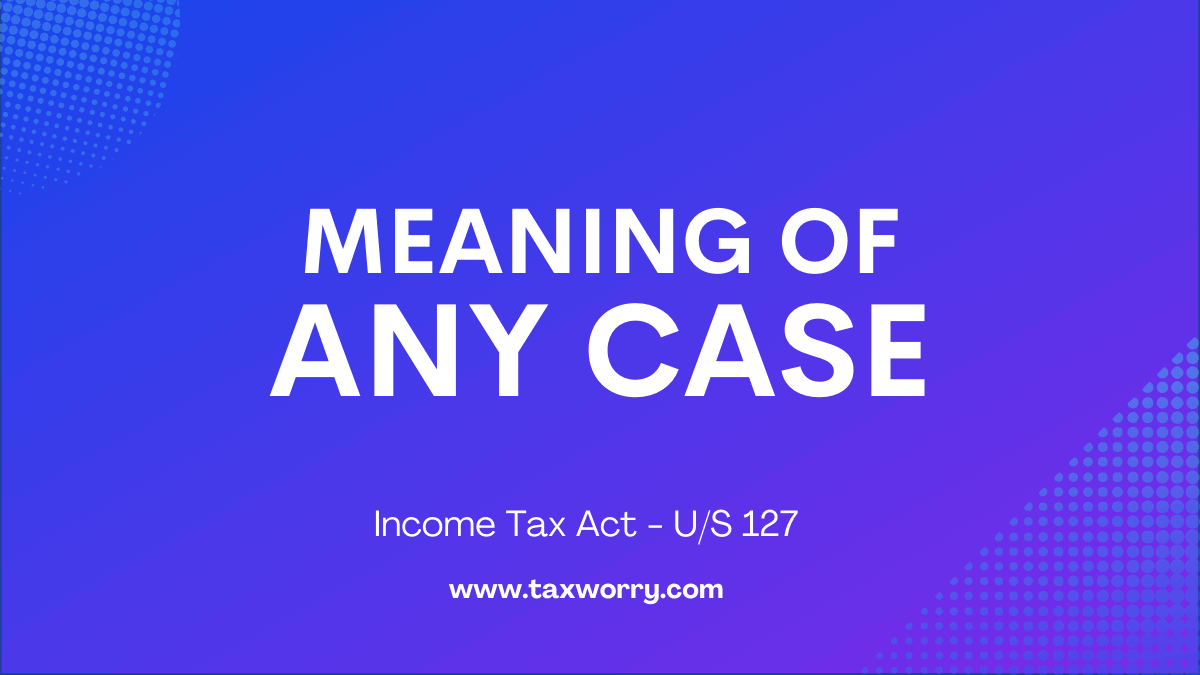Meaning of tax terms
Meaning of “Any case”
The meaning of any case under section 127 of the Income Tax Act is not defined in the act itself. But we can take guidance from decisions by various high courts. Here are excerpts of courts orders in which the Hon’ble High Court tried to explain the meaning of any case.

Meaning of any case
The phrase “any case” used in section 127 of the Income Tax Act came up before various high courts as detailed under :
1. Hon’ble Kerala high court explained the meaning of “any case” while delivering judgment in K.V. Kader haji v. CIT [2004] 140 taxman 527/268 ITR 465 (ker.) as under :
Meaning: Section 127 has used the expression ‘any case’. Explanation contains the word ‘case’ in relation to any person whose name is specified in any order or direction issued thereunder. Therefore, the expression ‘any case’ means all proceedings under the act in respect of any year. The expressions ‘any year’ and ‘any case’ exclude limitation of qualification which points to a distributive construction. The words ‘any case’ and ‘any year’ connote wider generality. The word ‘any’ may have one or several meanings; according to the circumstances it may mean ‘all’, ‘such’, ‘every’, ‘some’ or ‘one’ or more out of several.
2. Hon’ble ITAT- Kerala explained the meaning of “any case” while delivering judgment in K.P. Mohammed Sayyed v. CIT [2005] 144 taxman 401 (ker.-Trib.) as under :
Meaning: Block assessment’ would fall within the expression ‘case’ enabling the commissioner to transfer the cases relating to block assessment to the subordinate officer.
3. Hon’ble ITAT- Hyderabad explained the meaning of “any case” while delivering judgment in Maddi lakshmaiah & co. (P.) Ltd. V. Ito [1987] 21 itd 114/35 taxman 19 (hyd.-Trib.) as under :
Meaning: The use of phrase ‘any expenditure’ in section 37 is wide and comprehensive enough to include all forms of expenditure irrespective of whether they are direct or indirect expenditure. It is, thus, clear that the term ‘any expenditure’ used in section 37 is wide enough to include all outlays, charges, costs, prices which are laid out or expended wholly and exclusively for the purposes of business irrespective of whether it is in the nature of direct or indirect expenditure/costs. There are no words in section 37 from which it can be inferred that the provisions of section 37 are intended to cover indirect costs/expenditure alone.
Since section 37 specially deals with ‘any expenditure’, the general provisions of section 28 would not apply to those expenses which are specially covered by section 37.
Section 127 of Income Tax Act
Power to transfer cases.
127.(1) The Principal Director General or Director General or Principal Chief Commissioner or Chief Commissioner or Principal Commissioner or Commissioner may, after giving the assessee a reasonable opportunity of being heard in the matter, wherever it is possible to do so, and after recording his reasons for doing so, transfer any case from one or more Assessing Officers subordinate to him (whether with or without concurrent jurisdiction) to any other Assessing Officer or Assessing Officers (whether with or without concurrent jurisdiction) also subordinate to him.
(2) Where the Assessing Officer or Assessing Officers from whom the case is to be transferred and the Assessing Officer or Assessing Officers to whom the case is to be transferred are not subordinate to the same Principal Director General or Director General or Principal Chief Commissioner or Chief Commissioner or Principal Commissioner or Commissioner,—
(a) where the Principal Directors General or Directors General or Principal Chief Commissioners or Chief Commissioners or Principal Commissioners or Commissioners to whom such Assessing Officers are subordinate are in agreement, then the Principal Director General or Director General or Principal Chief Commissioner or Chief Commissioner or Principal Commissioner or Commissioner from whose jurisdiction the case is to be transferred may, after giving the assessee a reasonable opportunity of being heard in the matter, wherever it is possible to do so, and after recording his reasons for doing so, pass the order;
(b) where the Principal Directors General or Directors General or Principal Chief Commissioners or Chief Commissioners or Principal Commissioners or Commissioners aforesaid are not in agreement, the order transferring the case may, similarly, be passed by the Board or any such Principal Director General or Director General or Principal Chief Commissioner or Chief Commissioner or Principal Commissioner or Commissioner as the Board may, by notification in the Official Gazette, authorise in this behalf.
(3) Nothing in sub-section (1) or sub-section (2) shall be deemed to require any such opportunity to be given where the transfer is from any Assessing Officer or Assessing Officers (whether with or without concurrent jurisdiction) to any other Assessing Officer or Assessing Officers (whether with or without concurrent jurisdiction) and the offices of all such officers are situated in the same city, locality or place.
(4) The transfer of a case under sub-section (1) or sub-section (2) may be made at any stage of the proceedings, and shall not render necessary the re-issue of any notice already issued by the Assessing Officer or Assessing Officers from whom the case is transferred.
Explanation.—In section 120 and this section, the word “case”, in relation to any person whose name is specified in any order or direction issued thereunder, means all proceedings under this Act in respect of any year which may be pending on the date of such order or direction or which may have been completed on or before such date, and includes also all proceedings under this Act which may be commenced after the date of such order or direction in respect of any year.
In this article, you can get guidance from high courts on the meaning of any case under Section 127 of the Income Tax Act.
Updated up to Finance Act 2021
